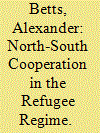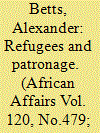|
|
|
Sort Order |
|
|
|
Items / Page
|
|
|
|
|
|
|
| Srl | Item |
| 1 |
ID:
081548


|
|
|
|
|
| Publication |
2008.
|
| Summary/Abstract |
This article explores the role of issue linkage in North-South relations in the global refugee regime between 1980 and 2005. It argues that North-South cooperation has been crucial for overcoming collective action failure in the regime. However, it suggests that because of the absence of a binding normative framework or overriding interest impelling Northern states to support refugee protection in the South, the prospects for overcoming North-South impasse have depended upon the ability of states and the Office of the United Nations High Commissioner for Refugees (UNHCR) to use issue linkage to connect the "refugee issue" to states' wider interests in other issue areas of global governance-notably migration, security, development, and peacebuilding. The article makes this argument by examining the four principal case studies of UNHCR-led attempts to facilitate North-South cooperation in order to address mass influx or protracted refugee situations in specific regional contexts: the International Conferences on Assistance to Refugees in Africa of 1981 and 1984; the International Conference on Central American Refugees of 1987-1994; the Comprehensive Plan of Action for Indochinese Refugees of 1988-1996; and the Convention Plus initiative of 2003-2005.
|
|
|
|
|
|
|
|
|
|
|
|
|
|
|
|
| 2 |
ID:
178096


|
|
|
|
|
| Summary/Abstract |
Uganda’s self-reliance policy for refugees has been recognized as among the most progressive refugee policies in the world. In contrast to many refugee-hosting countries, it allows refugees the right to work and freedom of movement. It has been widely praised as a model for other countries to emulate. However, there has been little research on the politics that underlie Uganda’s approach. Why has Uganda maintained these policies despite hosting more refugees than any country in Africa? Based on archival research and elite interviews, this article provides a political history of Uganda’s self-reliance policies from independence to the present. It unveils significant continuity in both the policies and the underlying politics. Refugee policy has been used by Ugandan leaders to strengthen patronage and assert political authority within strategically important refugee-hosting hinterlands. International donors have abetted domestic illiberalism in order to sustain a liberal internationalist success story. The politics of patronage and refugee policy have worked hand-in-hand. Patronage has, in the Ugandan case, been integral to the functioning of the international refugee system. Rather than being an inevitably ‘African’ phenomenon or the unavoidable legacy of colonialism, patronage politics has been enabled by, and essential to, liberal internationalism.
|
|
|
|
|
|
|
|
|
|
|
|
|
|
|
|
| 3 |
ID:
117943


|
|
|
|
|
| Publication |
2013.
|
| Summary/Abstract |
The existing literature on regime complexity has generally focused on its impact on the behavior of states; in contrast, this article explores its implications for international organizations. Many organizations within the UN system were established in the aftermath of World War II, at a time when they held a de facto monopoly in a given policy field. Gradually, however, institutional proliferation has created a range of institutional overlaps that may have complementary or competitive relationships to the referent organization of the original regime. Developing the concept of challenged institutions, this article explores how international organizations are affected by and strategically respond to growing institutional competition. Through a case study of the Office of the UN High Commissioner for Refugees' response to an increasingly competitive institutional environment, it argues that the concept of challenged institutions highlights the dilemmas faced by multilateral organizations in a rapidly changing landscape of global governance.
|
|
|
|
|
|
|
|
|
|
|
|
|
|
|
|
| 4 |
ID:
098429


|
|
|
|
|
| Publication |
2010.
|
| Summary/Abstract |
The modern refugee regime, created in the aftermath of World War II, provides protection mainly to people who flee individualized persecution or generalized violence. Subsequent to its creation, a range of new drivers of external displacement-particularly related to the interaction of environmental change, livelihood collapse, and state fragility-have emerged that fall outside the framework of the regime. In order to examine institutional responses to these people, this article develops the concept of survival migration, which describes people who have left their country of origin because of an existential threat for which they have no domestic remedy. It examines six case studies of national and international institutional responses to survival migrants from Zimbabwe, Somalia, and the Democratic Republic of Congo (DRC), which fall outside the 1951 Refugee Convention. Based on a conceptual model of regime stretching, the article offers an explanation for variation in the extent to which the existing global regime has adapted to address survival migration in different national contexts.
|
|
|
|
|
|
|
|
|
|
|
|
|
|
|
|
| 5 |
ID:
183224


|
|
|
|
|
| Summary/Abstract |
The Dollo Ado refugee camps, located close to the Ethiopian-Somali border, have been a major focus for the United Nations Refugee Agency (UNHCR)'s attempts to build livelihoods for refugees and the host community. The context presents an analytical puzzle: despite the importance of cross-border activity to refugees’ socioeconomic lives, such transnational activity has been institutionally invisible to and hindered by the international agencies seeking to assist them. The article explores how and why refugees’ cross-border activities have been systematically ignored by international institutions. As a theoretical starting point, it draws upon the post-development literature, and notably the work of James Ferguson, which explores how international institutions frequently misunderstand the agency and strategies of their subject populations. However, contra Ferguson's predominantly Foucauldian methodological and epistemologically approach, the article adopts a mixed methods approach, and emphasises the agency of aid workers, bureaucratic politics, and political economy in its account of the disjuncture between international institutions’ state-centric livelihoods programmes and refugees’ own cross-border economic strategies.
|
|
|
|
|
|
|
|
|
|
|
|
|
|
|
|
|
|
|
|
|